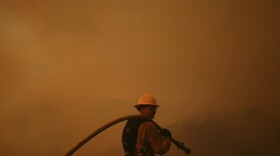-
As Idahoans endure weeks of wildfire smoke each summer, a neurologist is warning that what we breathe doesn't just irritate our lungs — it may be harming our brains as well.
-
As our climate changes and wildfires become a larger part of living in the West, one local artist’s work looks at our relationship with changing landscapes.
-
Momentum is building toward deployment of respirators to protect wildland firefighters from a long list of toxins. But researchers argue that the workforce’s practical concerns would need to be addressed for implementation to be successful.
-
The Healthy Lungs for Heroes Act was introduced by Democratic California Senator Adam Schiff and Republican Utah Senator John Curtis. If passed, the U.S. Department of Agriculture and other federal officials would have one year to develop a plan to make “commercially available appropriate respiratory personal protective equipment for wildland firefighters and supporting staff in settings in which smoke exposure surpasses covered permissible exposure limits.”
-
The tragic Los Angeles fires were a historically destructive disaster, but they also presented a unique opportunity to study the toxic exposures faced by firefighters. New findings point to a heightened risk for serious diseases like lupus.
-
Every summer, thousands of wildland firefighters endure months of heavy exposure to smoke and other toxins without respiratory protection. As a troubling picture of the health implications emerges, policies are beginning to change.
-
New research shows that wildfires are a major contributor to ozone pollution, and can significantly exceed the impacts of human-generated emissions.
-
In recent months, concern about the health risks wildland firefighters face has been growing. Now a major conference exploring that issue has started in Colorado.
-
The federal government has issued new guidelines to wildland firefighters for the voluntary use of protective masks. The move comes as knowledge of long-term health risks faced by such workers – including cancer – grows.
-
More hot days and more smoky days are affecting our children's health now and in the future.

Play Live Radio
Next Up:
0:00
0:00
Available On Air Stations










